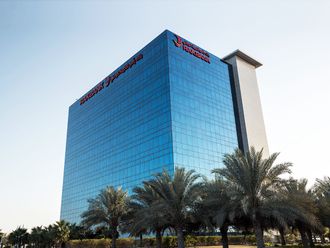“Financial Inclusion,” has become an important buzz word in economic circles today, as countries across the globe explore a variety of ways and means to deliver financial services at affordable costs to the disadvantaged and low-income segments of society.
In this context, the UAE finds itself in a unique position among the world’s leading economies, in that a large section of the population still remains unbanked. According to the most recent data from The World Bank, only half of those aged 15 and over in the UAE have a bank account. When compared to the United States, where 88 per cent of people over 15 have an account at a financial institution, or the UK, where the figure is 97 per cent, it is patently evident that there is huge potential for strong and inclusive growth, which will have significant benefits for the UAE economy as a whole.
The transient nature of the country’s population which is heavily weighted towards expatriate residents, and the presence of a large number of blue-collar workers mean that financial inclusion for all will continue to be a significant challenge for the UAE government. However, given the UAE’s aspiration to become one of the top ten economies per capita by 2021, there needs to be a concerted effort to promote financial inclusion and encourage economic empowerment if this bold, but attainable goal is to be reached.
Before we explore this situation further, it is also important to understand the significance of financial inclusion for a country. Typically, comprehensive financial inclusion is a situation where all citizens/residents have access to an appropriate range of financial products and services, which allows them to effectively manage their money, regardless of their level of income or social status. Financial inclusion therefore means improved access to finance for the economically disadvantaged and unbanked, leading to empowerment of individuals and families, opening the doors to income-earning opportunities, and paving the way for enriching whole countries.
The absence of options to save wages and the prevalence of a cash economy make the unbanked population vulnerable, while the presence of banking services and products is a vital tool to promote financial responsibility. The ability for individuals in the UAE to have access to a full range of financial services even at the lowest level, including a savings or deposit offering, a payment and international transfer facility, and insurance, will lead to higher and more durable levels of national economic growth.
With improved financial access and planning, individuals and families can better manage their finances and ensure greater financial security for the future. Furthermore, they can also insure against unforeseeable, adverse events and avoid falling deeper into poverty or debt, which is often the result with such incidents.
Leverage benefits of WPS
As far as the Middle East is concerned, the UAE is perhaps ideally poised to effectively implement a financial inclusion strategy, especially given the ‘Smart Country’ vision of its leaders. A key step towards the successful implementation of the financial inclusion strategy is to optimally leverage the benefits of the Wages Protection System (WPS), which allows the Ministry of Labour to create a database that records wage payments in the private sector to guarantee the timely and full payment of wages. Since the WPS covers all institutions registered with the Ministry and benefits different categories of labour, it is essential that any financial inclusion initiatives must necessarily be linked to the WPS. This will enable a more comprehensive uptake of the initiative across all levels of the population and will ensure better measurement of its results and benefits. These crucial measures being taken by the Ministry of Labour will go a long way in complementing the government’s ongoing efforts of addressing the needs of all socio-economic segments and creating a truly financially inclusive society.
Equally, it is crucial that financial inclusion initiatives be linked to next generation technologies, which will provide the catalyst to open up affordable and accessible financial services to everyone.
Exclusive prepaid cards, which can be loaded with salaries and used for Point of Sale (POS) and online payments, international remittances and the like is one of the many steps being considered in an effort to offer financial services to the unbanked. Indeed, Network International has already demonstrated that Emirates Identity cards can be used in mainstream financial applications, making banking and payment services available to the entire population without discrimination.
Given the rapid technological developments in the payments industry, it remains to be seen what new wonders await us on the journey to complete financial inclusion.
— the writer is the Chief Executive Officer of Network International











